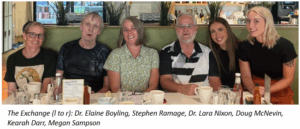Older Adults Experiencing Homelessness: Finding Home with Their Voices
Article by Monique Beneteau with content provided by Doug McNevin, Dr. Jillian Alston and Dr. Lara Nixon
Doug’s Story
Doug found himself without a home in 2015. He lived and navigated the streets of Calgary for nearly a year. He occasionally used the services of a shelter but he preferred to manage on his own. One day in 2016, someone reached out to Doug and told him about Peter Coyle Place, a 70-suite facility geared to adults 55 years and older. Doug moved in. At first, he shared space in a dorm-like setting and then a year later, he moved into a unit of his own. He had found a place where he could have stability.
 Doug isn’t alone in the challenge he faced to find appropriate housing as an older adult. According to Canada’s National Shelter Study, the proportion of shelter users aged 50 and older more than doubled in just over 15 years, rising from 13.5% (19,179 individuals) in 2005 to 32% in 2021. Data from 2005 to 2014 show that people older than 50 were the only age group to experience an increase in shelter use, suggesting a unique vulnerability to housing insecurity affecting these older adults. According to Dr. Alston et al. (2024) in a CMAJ article, “In 2021, 32% of people using shelters were aged 50 years and older. These statistics do not include the many older adults who were unsheltered, living outdoors, and experiencing hidden homelessness in provisional accommodations, such as living temporarily with friends or family.” Additionally, some older adults are “housed” temporarily in hospital waiting for suitable community housing.
Doug isn’t alone in the challenge he faced to find appropriate housing as an older adult. According to Canada’s National Shelter Study, the proportion of shelter users aged 50 and older more than doubled in just over 15 years, rising from 13.5% (19,179 individuals) in 2005 to 32% in 2021. Data from 2005 to 2014 show that people older than 50 were the only age group to experience an increase in shelter use, suggesting a unique vulnerability to housing insecurity affecting these older adults. According to Dr. Alston et al. (2024) in a CMAJ article, “In 2021, 32% of people using shelters were aged 50 years and older. These statistics do not include the many older adults who were unsheltered, living outdoors, and experiencing hidden homelessness in provisional accommodations, such as living temporarily with friends or family.” Additionally, some older adults are “housed” temporarily in hospital waiting for suitable community housing.
Health and Housing
Health issues and housing are inextricably linked. There are several reasons why:
- Hardship is hard on our bodies. Chronic stress, more difficulty maintaining a healthy diet, poor sleep, and inequitable access to health care speeds up aging. A landmark U.S. study by Brown et al. found that homeless adults with a median age of 58 years exhibited geriatric syndromes at rates comparable to or higher than their housed counterparts with a median age of 79 years. In other words, the health of a 58-year-old adult without housing is similar to someone who is 20 years older with stable housing. This makes a strong case for why the age of 50 is the appropriate threshold when defining an “older adult” experiencing homelessness.
- Issues that become more common in aging, such as worsening chronic health conditions, reduced income, or difficulties keeping up with household tasks leading to missed rent payments, or a mobility change that leads to difficulty accessing a rent-controlled walk-up apartment,
 may challenge the ability to maintain housing and be the final straw that tips an older adult with precarious housing into homelessness.
may challenge the ability to maintain housing and be the final straw that tips an older adult with precarious housing into homelessness. - While homelessness appears to be a catalyst for complex health and functional challenges, individuals experiencing homelessness have reduced access to the health services they need. Geriatric health services often have an age requirement of 65 years or older which systematically denies access to many individuals experiencing homelessness in their 50s who, as mentioned above, often present with health conditions experienced by older adults–functional limitations, cognitive challenges, and multiple chronic conditions.
- Shelters are not equipped to meet the complex health needs of many older adults. Individuals in shelters have a harder time accessing health services even when they are eligible, due to barriers in navigating health care. Imagine an older adult with mobility issues, cognitive issues, and many medications, without a phone or an address, trying to manage their medicines and navigate traditional outpatient care from a drop-in shelter that requires them to vacate during the day. This creates a critical service gap and a cycle of worsening health and further marginalization.
Older adults in shelters face adverse events, including falls and hospital admissions, and often have prolonged hospital stays due to inadequate discharge options. Complex health needs and functional decline also make it harder for many older adults to exit homelessness. While housing is an important health intervention for older adults, due to a lack of inclusion of older adults in most housing and homelessness strategies, options that are designed to support aging in place and successful tenancy are desperately needed. Older adults experiencing homelessness also face barriers to accessing home care services due to a lack of a home to receive them. Long-term care homes (LTCH) may be the most appropriate environment for some older adults experiencing homelessness who require higher levels of support with activities of daily living. Finally, in the same CMAJ article, Dr. Alston and colleagues wrote, “Older adults experiencing homelessness, who have often have [sic] a history of injustice and trauma, require individualized and integrated approaches to meet their needs; these approaches require collaborations between health and long-term care, public health, housing, and other community agencies.”
Geriatric Outreach Program to Seniors (Toronto)
One initiative trying to support the health of older adults accessing shelters is led by Dr. Jillian Alston and social worker Alesia Campbell in Toronto. They provide specialized geriatric care to older adults (based on physiology – not age) in select shelters and transitional residences. The in-shelter model reduces barriers to accessing office-based care, provides a familiar environment for building trust with residents, and facilitates better collaboration with the shelter. In the first two years of the Geriatric Outreach Program to Shelters (GPS), 99 individuals, ranging in age from 50 to 91 (yes, 91!), received a Comprehensive Geriatric Assessment. Over half of the individuals had cognitive impairment, with nearly two-thirds being diagnosed for the first time through this program. Jillian and Alesia also focus on how to support the individuals they see as they transition from the shelter environment.
age) in select shelters and transitional residences. The in-shelter model reduces barriers to accessing office-based care, provides a familiar environment for building trust with residents, and facilitates better collaboration with the shelter. In the first two years of the Geriatric Outreach Program to Shelters (GPS), 99 individuals, ranging in age from 50 to 91 (yes, 91!), received a Comprehensive Geriatric Assessment. Over half of the individuals had cognitive impairment, with nearly two-thirds being diagnosed for the first time through this program. Jillian and Alesia also focus on how to support the individuals they see as they transition from the shelter environment.
When assessing individuals who are experiencing first-time homelessness, they were surprised to meet older adults who were actually on LTCH waitlists before becoming homeless, highlighting significant gaps in societal safety nets. Once in the shelter system, they found that LTCH seemed to be more than a matter of lengthy wait times for older adults, which motivated the completion of a mapping study to describe the barriers and facilitators to LTCH from shelters (manuscript under preparation).
While there are shelter and housing services available for older adults, there are fewer of those than there are for other populations and, even fewer still, that provide these much-needed health and social services. As our population ages, these senior-specific services will be even more imperative.
The Exchange (Calgary)
Doug was lucky to get into Peter Coyle Place. At the time that he resided there, the facility had in-house social workers, personal support workers, housekeeping support and full meal services. Visiting health providers including nurses, care aids, a nurse practitioner and family physicians, worked closely to provide wrap-around services with the in-house team. In 2019, “The Exchange” was established and was an initiative that began as part of a study focused on harm reduction housing with older adults. Initially, the project brought residents together with project developers, family physicians and researchers Dr. Lara Nixon and Dr. Martina Kelly, Recreation Therapist Kearah Darr, and researcher Megan Sampson. They talked about ways they could influence the  experience of the residents in the facility. It began with a “Welcome to Peter Coyle Place” pamphlet to create a more welcoming environment to new residents. Then, a grant was secured to include recreational programming co-designed with and for the residents; of which, 90% of residents participated and reported improved confidence to learn new skills and a sense of connection with community. Overall, the mission for The Exchange is to advise on expanding services that promote health and quality of life for older people with experiences of homelessness and housing insecurity. They chose the name ‘The Exchange’ with the hope of promoting the exchange of ideas between health care providers, policy makers, and older citizens.
experience of the residents in the facility. It began with a “Welcome to Peter Coyle Place” pamphlet to create a more welcoming environment to new residents. Then, a grant was secured to include recreational programming co-designed with and for the residents; of which, 90% of residents participated and reported improved confidence to learn new skills and a sense of connection with community. Overall, the mission for The Exchange is to advise on expanding services that promote health and quality of life for older people with experiences of homelessness and housing insecurity. They chose the name ‘The Exchange’ with the hope of promoting the exchange of ideas between health care providers, policy makers, and older citizens.
Doug was one of the first residents to participate in The Exchange. He is passionate about making sure that their work is shared broadly so that others can also benefit. While Doug moved out in 2023, with the support of friends, he continues to stay in touch with members of The Exchange.
Since the CAGP-CCSMH Annual Scientific Meeting was held in Calgary in October, I took the opportunity to meet with Doug. He speaks with such enthusiasm and fondness for The Exchange and the people who made it happen. Doug said that, for him, The Exchange supported his autonomy and choice, which was in short supply as he engaged with the ‘system.’ I asked him what he personally got out of his involvement and he said that he had a sense of purpose and a feeling of accomplishment. Doug also talked about how it was an opportunity to make new friends and to feel connected to others. He felt he was a bridge for other residents to help them to trust and engage with other people and services. Doug said, “there’s nothing better than putting a smile on a person’s face.”
2025 CAGP-CCSMH Award Recipients
The passionate and compassionate leaders and staff of both The Exchange and the Geriatric Outreach Program to Shelters (GPS) saw a need to engage with older adults living on the margins of our communities. These individuals are shining a light on an important issue by quietly working on innovative and inspiring initiatives. This is why these two groups received the 2025 CAGP-CCSMH Awards. The Exchange received the Vision Award and the Geriatric Outreach Program to Shelters (GPS) received the Seniors’ Mental Health Outstanding Care and Integrative Practice Award.
 Dr. Jillian Alston, Alesia Campbell, Doug McNevin, another Peter Coyle Place resident Stephen Ramage, and Dr. Lara Nixon were able to join us at our Celebration Dinner where CCSMH Co-chairs, Drs. Dallas Seitz and David Conn and Executive Director, Claire Checkland were able to present them with their awards. That put a smile on everyone’s face. Job well done, Doug!
Dr. Jillian Alston, Alesia Campbell, Doug McNevin, another Peter Coyle Place resident Stephen Ramage, and Dr. Lara Nixon were able to join us at our Celebration Dinner where CCSMH Co-chairs, Drs. Dallas Seitz and David Conn and Executive Director, Claire Checkland were able to present them with their awards. That put a smile on everyone’s face. Job well done, Doug!
